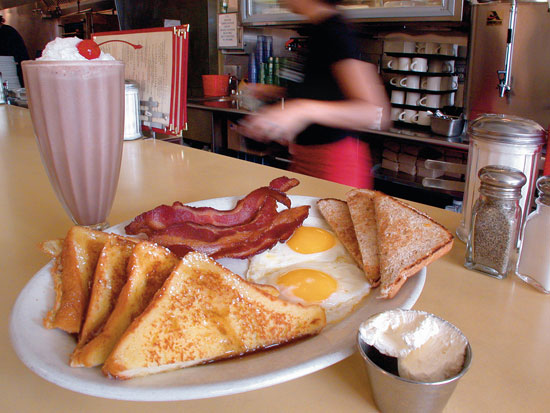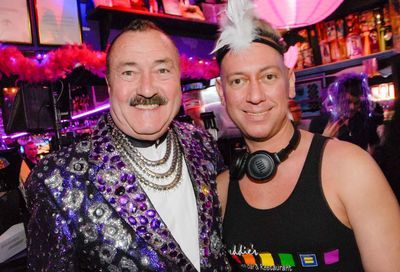Top 5 Nutrition Myths
Some of your weight-loss ''rules'' might be worth revisiting

”Quick fat loss with this one simple tip!” ”Eat what you want and shed the weight!” ”I lost 50 pounds in five weeks – here’s how!” Those are the sorts of quotes you see peppering the pages of health and nutrition magazines. And something nearly every article has in common? The perpetuation of very common myths to weight loss. Here are five of them, and the reasons why they simply aren’t true.
1. ”Eat breakfast to jump-start your metabolism.” This one has started from a pretty simple place. If you’re not eating in the morning, you’re not starting your body’s metabolism and fat-burning mechanisms. But that’s not how our bodies work. Actually, if you don’t eat the right things for breakfast, you’re liable to jump-start your fat storing – not fat burning. Everyone’s body is more susceptible to insulin spikes early in the day. Insulin is used for two operations in the body: muscle repair and fat storage. The more you spike your insulin, the more energy your body is going to store as fat to save for later. However, when you skip breakfast and put your body into a fasted state, it’s forced to look for energy stores to keep your body running optimally. The optimal stores are the fat.
2. ”Small meals keep your metabolism active throughout the day.” Once again, it would seem to make sense. If your body has something to burn, it will. Right? What isn’t taken into account, however, is that your body is designed to consume large amounts of food when it’s available and slowly release the nutrients to keep your body going. Smaller meals help keep those who need to be eating happy, but they can be detrimental to diets if portion control is a struggle. Eating a couple, or even one, large meal can create a great feeling of being full.
3. ”If you don’t eat enough your body will go into starvation mode and you’ll begin putting on weight.” Simply put, your body requires energy to run. It will not begin storing energy if it needs it to operate. This starvation mode doesn’t begin until you go without food and nutrients for weeks. On the other hand, the lower your intake of calories is, the more efficient your body will begin running. Things like a reduction in body temperature (which you can feel by your fingers and toes getting cold), less waste product from digestion, and general fatigue are signs that your calories may be too low, and causing a reduction in your metabolism, but it’s highly unlikely you’ll start putting on weight as a result.
4. ”To keep fat off your body, eat less of it on your food.” This one began in the early stages of nutrition studies. Scientists in the 1940s concluded that since those with high-fat diets had high-cholesterol levels, low-fat diets were the answer to a healthier life and less heart disease. By the 1980s, the low-fat diet approach was a nationwide mindset. However, fat is very important in anyone’s diet. Just as the scientists predicted, fats are responsible for your cholesterol levels. That means your HDL (the good cholesterol) as well. Fats are responsible for keeping those leveled out in your body. The omega-3 and omega-6 fatty acids are essential for mental health, balancing the hormones and chemicals responsible for our moods. Finally, many fat-free or low-fat foods use sugars as a way to replace the flavor lost when removing fat. Too much sugar is far more detrimental to your body than some fatty acids.
5. ”Don’t eat within two hours of going to sleep.” When you’re sleeping, your body is in an inactive state and stores anything eaten in the last couple hours as body fat. Not exactly. There are some hormonal changes that happen when you are sleeping, but food consumed isn’t affected. The total caloric intake is far more important than the slight changes that take place when your body is at rest.
The science of nutrition is constantly changing and evolving. The easiest way to confirm something is to test it yourself, note your results, and adjust accordingly. Knowing is half the battle.
Support Metro Weekly’s Journalism
These are challenging times for news organizations. And yet it’s crucial we stay active and provide vital resources and information to both our local readers and the world. So won’t you please take a moment and consider supporting Metro Weekly with a membership? For as little as $5 a month, you can help ensure Metro Weekly magazine and MetroWeekly.com remain free, viable resources as we provide the best, most diverse, culturally-resonant LGBTQ coverage in both the D.C. region and around the world. Memberships come with exclusive perks and discounts, your own personal digital delivery of each week’s magazine (and an archive), access to our Member's Lounge when it launches this fall, and exclusive members-only items like Metro Weekly Membership Mugs and Tote Bags! Check out all our membership levels here and please join us today!






















